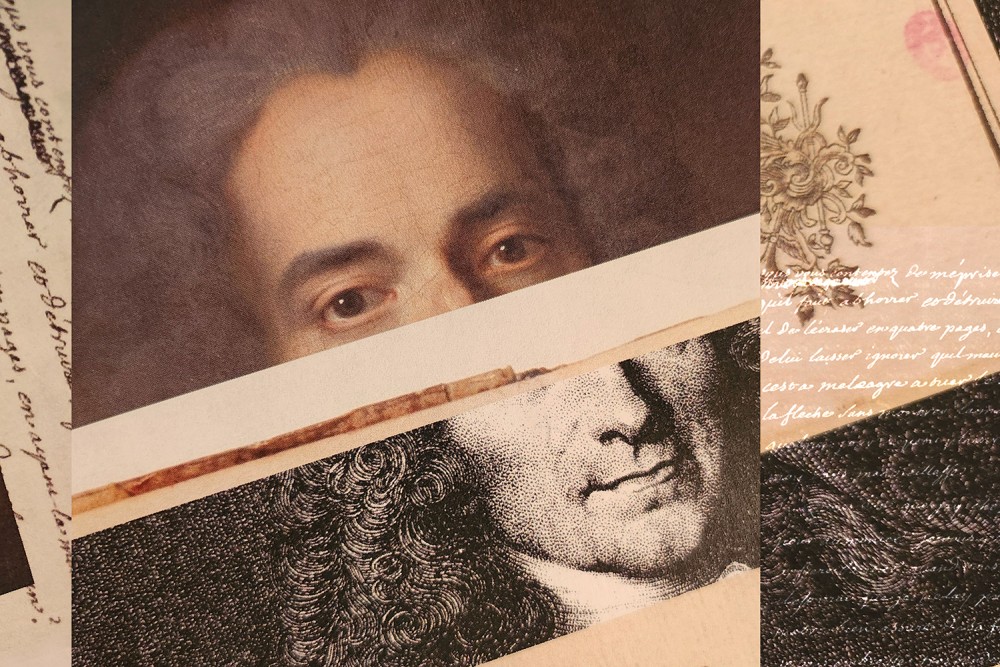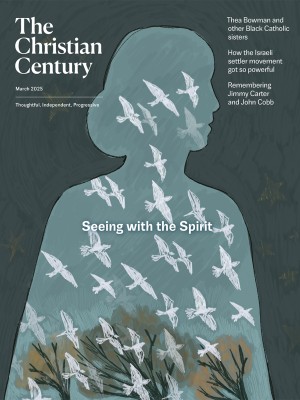Voltaire’s encounter with the crucified Christ
The Enlightenment thinker was fiercely critical of religion. But what did he mean by religion?

Century illustration (Source images: Creative Commons)
“As long as there are fools and rascals there will be religions,” Voltaire declares in a letter to his friend Frederick II of Prussia. “Ours is assuredly the most ridiculous, the most absurd and the most bloody which has ever infected this world.” The royal recipient wrote back that the task of utterly expunging the crumbled remnant of Christianity had been reserved for Voltaire.
Voltaire’s stance appears straightforward: he condemns Christianity, and he is almost commissioned to complete its annihilation, to crush the infamy (écrasez l’infâme). However, before calling Voltaire a most fierce critic, it is worthwhile to take a look at his use of the word religion and its context.
Read our latest issue or browse back issues.
“Religion” is an entry in Voltaire’s Philosophical Dictionary of 1764. It being a philosophical dictionary, the reader who anticipates translations or definitions of terms anticipates in vain. “Atoms,” “Lent,” “truth”— just to name a few examples—are discussed and fantasized about rather than defined. The entries often take interesting but unexpected turns, an amusing example being the curriculum in truth designed for Pilate in order to make him a theologian. The entry on religion, likewise, leads the reader on an unexpected track. It is significant for its thrilling insight into the spiritual perception of one of the most prominent thinkers of the Enlightenment, one that turns our expectations of Voltaire’s critique of “ridiculous” Christianity on its head.
The entry on religion starts with Voltaire’s contemplation of the divine intelligence which presides over the beautiful universe. How is it properly worshiped? All of a sudden, Voltaire is swept away to a desert. The piles of bones found there paint a picture of a vision conspicuously similar to Ezekiel’s vision of the dry bones of the God-defiant and spiritually desolated Israelites in Ezekiel 37:1–14. Voltaire learns from his archangel that the bones have been collected for his instruction. The archangel accordingly begins to explain.
The first pile is made up of the bones of the Jews slaughtered for their religious transgressions, such as worshiping the golden calf and having sex with non-Jewish women. The number of victims amounts to 300,000. This number, however, is overshadowed by the next. If the bones of all Christians who have killed each other in disputes had been heaped upon one another, they would have reached the sky. The bones, therefore, have been subdivided into quadricentennial piles. The last pile holds 12 million Indigenous Americans who were killed for being unbaptized.
The narrator is dismayed. Yet there are more piles, this time composed of silver and gold. These serve as monuments to the real motive behind the killing: avarice. Voltaire weeps.
At this point, the active part of Voltaire’s instruction begins. The archangel now invites his mentee to talk to, as he put it, “the heroes of humanity,” who zealously attempted to outroot human ferocity. The heroes are five ancient sages, each described with characteristic features. Numa Pompilius, the pious second king of Rome, wears a crown and holds a censer; Pythagoras, the mathematician and philosopher, shows by a gesture that Voltaire must not speak and carries beans, which he is known for having venerated as containers of souls; Zoroaster, the Persian founder of Zoroastrianism, has the hundred doors to wisdom (Sad Dar) that figure in his teachings; and Socrates has a flat nose and a humble attitude.
After speaking with Socrates, Voltaire sees another executed man. The man’s physical appearance baffles him. His hands and feet are bloody, his side gored, and his ribs whipped. He is the only sage not called by name; the archangel even warns Voltaire not to ask who he is. But the reader knows that Voltaire the author knows whom he is describing. What track does this ostensibly anonymous sage lead Voltaire upon? What about the appearance of this sage makes Voltaire’s understanding of religion significant?
IN 1762, TWO YEARS BEFORE the publication of Voltaire’s dictionary, the court of Toulouse convicted Jean Calas of filicide. Calas, a Protestant, was accused of having killed his son to stop him from becoming a Catholic. Calas submitted to various torture devices, including having his bones broken on the wheel. Voltaire saw the case as a perfect example of religious persecution and fanaticism; he writes in his Treatise on Tolerance that the citizens of Toulouse even advertised Calas’s execution as the chief attraction of their bicentennial festival commemorating the massacre of 4,000 Protestants. “Fanaticism, indignant over reason’s recent successes, struggles under it even more angrily,” Voltaire writes in the same treatise concerning the execution.
One of the main driving forces behind the Enlightenment was the promotion of inquiry subjected to reason, an intellectual verification. “Pre-enlightened” traditions of religious intolerance could not be intellectually defended and were therefore frequently criticized by philosophers of the Enlightenment, among whom some examples on this topic include Spinoza, Locke, Bayle, and Hume.
In the entry on religion, Voltaire exclaims that he just saw another man—Socrates—treated hatefully but that the treatment of this last, unnamed sage is considerably worse. He initiates his conversation with Christ by asking whether he also, like Socrates, fell victim to “wicked priests and wicked judges.” Christ replies that he did. The most thoroughly reported exchange in the entry on religion is thus commenced.
Christ is the only one among the five sages who has any connection whatsoever to the piles of bones. He could potentially be to blame for that pile, and Voltaire inquires into the question of guilt. Did Christ not say that he came into the world with a sword (Matt. 10:34)? Christ replies that this is a manuscript error. What he really said was that he came not with a sword but with peace. Voltaire is not satisfied. He goes on to ask whether Christ’s speeches, poorly interpreted as they are, played any role in the murdering and plundering. Christ says that he has seen the perpetrators with horror.
As their conversation continues, Voltaire learns what true religion is: true religion requires no external procedures. Voltaire is baffled. Can he eat meat on Fridays? Can he disregard making a pilgrimage, going on a retreat, and siding either with the Latin or Greek church? The resounding answer from Voltaire’s Christ is yes. One only needs to love God, regardless of who one is; Christ tells Voltaire that he never separated the Jews from the Samaritans. Apparently released, Voltaire cherishes Christ as his sole master. The vision is dissolved, and a pure conscience fills Voltaire.
Voltaire, a champion of reason, chose a peaceful Christ as master—in a time and place that anticipated persecution of Christians in the very name of reason.
THE RELIGION ENTRY IN Voltaire’s Dictionary might be interpreted as championing the use of reason. The external procedures Voltaire asks Christ about submit to the test of reason. This kind of test is characteristic for the Enlightenment, and remember that Christ is Ho Logos, the Word—or, in an extrabiblical ancient context, Reason—incarnate. Reason himself thus helps Voltaire the character realize that the external procedures are unreasonable. Although Voltaire could not possibly know what would happen 25 years after the publication of his Dictionary, it is tempting to think about the role of reason during the French Revolution (1789–1799). In 1793, the Reign of Terror commenced. The organization behind it, ironically called the Committee of Public Safety, would work to replace Christianity with a religion exalting reason itself as a deity. It is interesting, therefore, to see that a champion of reason chose a peaceful Christ as his sole master in a country and time that awaited persecution of Christians in the very name of reason.
In Ezekiel, the miracle is the resurrection of the dry bones due to the prophet’s breathing physical and spiritual revival over them on God’s command. But in Voltaire’s vision, there is no resurrection. There is no happy ending like that in Ezekiel, where the Israelites are reinfused by the spirit of God and delivered from a figurative death. The death in the entry on religion is not figurative. The historical atrocities cannot be undone. Even Christ, who raised Lazarus, laments their victims. Instead, it is Christianity that is resurrected. Voltaire was initially not sure whether Christ had something to do with the murders, and he learns that he did not. When Voltaire accepts Christ as his sole master, belief in Christ is acquitted of complicity and resurrected as a legitimate creed. This might surprise those who later embraced Voltaire against Christianity.
Voltaire is not only interested in Christ but also in Christ crucified. The other four sages are identified by characteristics known to pertain to them. These characteristics strive to show what values they cherished or what kind of people they were. Numa was a religiously devoted king, so he has both a crown and a censer; Pythagoras bid his disciples to initially guard silence, so he forbids Voltaire from speaking as well; Zoroaster has the hundred doors of Zoroastrianism; the physical and internal character of Socrates is presented as it is passed down to us by, for instance, Plato and Xenophon.
Nothing suggests that Christ is an exception to this pattern. Voltaire chooses to depict Christ neither as he was before his crucifixion nor as he was after his resurrection; that is, he could have made him an ordinary man or a glorious, death-conquering king. Instead, Christ looks as if he were still hanging on the cross. It calls to mind Paul’s admonition to see Christ in no other way but as crucified (1 Cor. 2:2). Voltaire seems to suggest that the crucified Christ is the most characteristic and truthful representation; to shed his blood for the absolution of sins is the very essence of Christ’s being. Belief in him as crucified passes the test of reason.
The entry on religion is complex and multifaceted. Voltaire, who championed so diligently for the crushed bones of Calas, encounters piles upon piles of innumerable bones in need of defense and meets the most humble and humiliated version possible of the founder of the creed whose alleged adherents would stack all those piles. It was the religion of Christianity that had killed the victims, Voltaire argues, not belief in Christ as he really is. The unexpected track here is the prevailing force of Christianity released from institutions. It was Christ just as he is whom Voltaire called his sole master.





